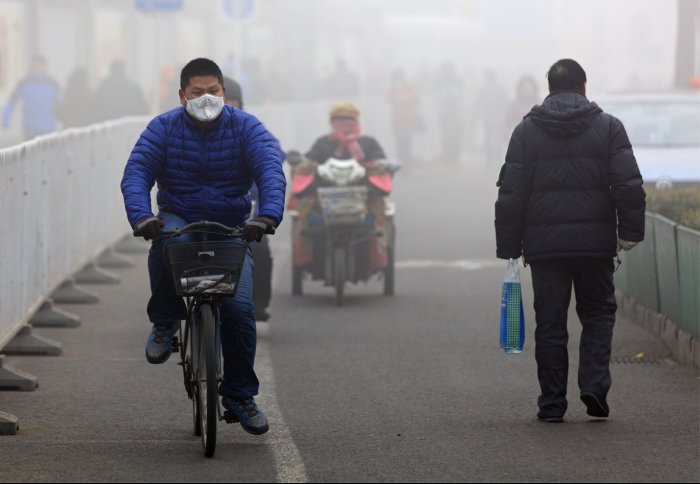Imperial experts join global effort to measure climate change's effect on health
by Simon Levey

A new initiative has launched today to understand what it calls the 'catastrophic risk to human health' caused by climate change.
Academics from 16 organisations including Imperial College London will establish a range of measures that allow them to track how climate change is affecting human health, and how the responses can have mutual benefits for health and the climate.
The weather will change for entire regions, leading to problems for people, agriculture and livelihoods that may be caused by, for example, heavier rain storms and increased water shortages.
– Professor Sir Brian Hoskins
Chair of the Grantham Institute – Climate Change and the Environment
The initiative The Lancet Countdown: Tracking Progress on Health and Climate Change proposes over 30 indicators, for example tracking the spread of infectious diseases, deaths or illness resulting from heatwaves or droughts, and health problems caused by air pollution. The initiative will also identify policies that provide win-win solutions for health and climate.
The initiative was announced on Monday at the United Nations climate change conference (COP22) taking place in Marrakech, Morocco.
Researchers Dr Kris Murray at the Grantham Institute and Professor Paolo Vineis at Imperial's School of Public Health are contributing to the development of the Lancet Countdown.
Dr Murray is working on developing indicators to track climate change impacts on health from infectious diseases, such as the changing distributions of mosquitos that carry dangerous infectious diseases like dengue. Professor Vineis is working to determine the effect of policies that aim to cut emissions and improve health, such as promoting healthy, sustainable diets, such as reducing high meat consumption in the developed world.
With the aim of ensuring the case for action on health and climate change is more widely evidenced and understood, the Lancet Countdown is designed to inform decision-making and drive an accelerated policy response to climate change. It will complement other initiatives, such as the Intergovernmental Panel on Climate Change (IPCC) and its achievements for climate science.
linking Climate and health
Professor Sir Brian Hoskins, an eminent expert in meteorology and climate change and chair of the Grantham Institute – Climate Change and the Environment, at Imperial College London, said:
"We know climate change will lead to a rise in average global temperatures over the twenty-first century. However, it is important to note that an average rise of two degrees Celsius will mean melting ice and permafrost in polar regions but also the hottest regions of the Earth warming to a climate not seen on Earth while humans have inhabited the planet.
"Populous coastal regions can expect to see more flooding with sea levels rising by perhaps half a meter, with all the problems that entails for health and sanitation. The weather will change for entire regions, leading to problems for people, agriculture and livelihoods that may be caused by, for example, heavier rain storms and increased water shortages."
The health impacts of climate change are already being felt and affecting some of the most vulnerable on our planet. No one is immune or out of reach.
– Patricia Espinosa
Executive Secretary, UN Framework Convention on Climate Change
Patricia Espinosa, Executive Secretary, UN Framework Convention on Climate Change, welcomed the Lancet Countdown launch: “The health impacts of climate change are already being felt and affecting some of the most vulnerable on our planet. No one is immune or out of reach.
"Climate action, spearheaded by governments and supported by business, cities, investors and citizens – including health care professionals – goes hand-in-hand with delivering a better quality of life in its own right and as a key pillar of the Sustainable Development Goals.”
The Lancet Countdown will be the subject of a lecture tonight at UCL by former UN chief climate diplomat Ms Christiana Figueres
the need for decisive action
The Lancet Countdown builds on the findings of the 2015 Lancet Commission on Health and Climate Change, which concluded that targeted action on reducing the magnitude and impacts of climate change is the greatest opportunity to improve global health in the twenty-first century.
Dr Richard Horton, Editor-in-Chief of The Lancet said: "One challenge of the ongoing global climate crisis is to convey the urgency of our collective predicament and the need for decisive action. The Lancet Countdown on Health and Climate Change is being launched today to amass the evidence needed to hold policy makers accountable for their promises and commitments.
The research community can make an important contribution to heightening political awareness and accelerating progress to a healthier, low-carbon world. These are the goals of our Countdown on Health and Climate Change."
Imperial College London and the Grantham Institute - Climate Change and the Environment, one of Imperial's Global Challenge Institutes, is working alongside The Lancet Countdown partners including UCL, Tsinghua University, China, and the Washington-based policy institute, Centre for Climate & Security. The World Meteorological Organisation (WMO) and World Health Organization (WHO) will aid the collaboration in making best use out of national data sources, and ensure strong engagement with ministries of health.
A full list of participating organisations and a consultation for input can be found on the Lancet Countdown website.
Article text (excluding photos or graphics) © Imperial College London.
Photos and graphics subject to third party copyright used with permission or © Imperial College London.
Reporter
Simon Levey
Communications Division